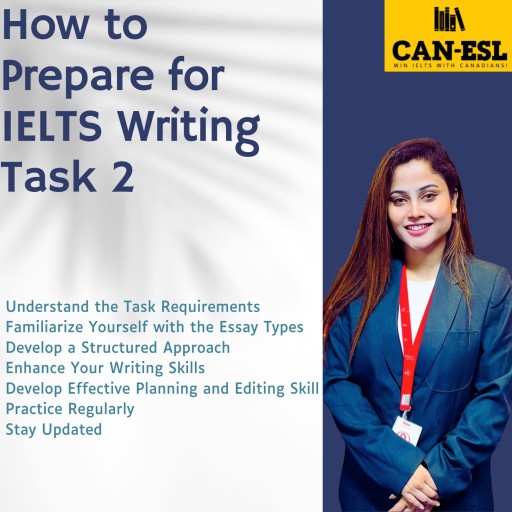
How to Prepare for IELTS Writing Task 2
Uploaded

IELTS Listening
15-Aug-2024
IELTS Listening
How to Prepare for IELTS Writing Task 2
1. Understand the Task Requirements
IELTS Writing Task 2 Overview:
- Format:
You’ll be asked to respond to a point of view, argument, or problem.
- Word
Count: Minimum 250 words.
- Types
of Essays: Opinion essays, discussion essays, problem-solution essays,
and advantage-disadvantage essays.
Objective:
- To
assess your ability to present and justify an opinion, discuss issues, or
propose solutions clearly and coherently.
2. Familiarize Yourself with the Essay Types
Opinion Essays:
- Example:
Do you agree or disagree with the statement?
- Preparation:
Practice presenting a clear opinion and supporting it with relevant
examples.
Discussion Essays:
- Example:
Discuss both views and give your opinion.
- Preparation:
Develop the ability to discuss multiple viewpoints and provide a balanced
argument.
Problem-Solution Essays:
- Example:
Identify problems and propose solutions.
- Preparation:
Practice analyzing issues and coming up with feasible solutions.
Advantage-Disadvantage Essays:
- Example:
Discuss the advantages and disadvantages of a particular issue.
- Preparation:
Work on listing and explaining both pros and cons clearly.
3. Develop a Structured Approach
Essay Structure:
- Introduction:
Paraphrase the question and state your thesis or main argument.
- Body
Paragraphs:
- Body
Paragraph 1: Present your first main idea with examples.
- Body
Paragraph 2: Present your second main idea with examples.
- Body
Paragraph 3: (if necessary) Include additional points or
counterarguments.
- Conclusion:
Summarize your arguments and restate your opinion or key points.
Tips:
- Clarity:
Each paragraph should have a clear main idea.
- Cohesion:
Use linking words to connect ideas smoothly.
- Relevance:
Ensure all examples and arguments directly support your thesis.
4. Enhance Your Writing Skills
Grammar and Vocabulary:
- Grammar:
Practice using a range of sentence structures and tenses.
- Vocabulary:
Use varied and precise vocabulary. Avoid repetition and learn synonyms.
Practice:
- Timed
Practice: Write essays within the 40-minute time limit to simulate
exam conditions.
- Feedback:
Get your essays reviewed by teachers or use online tools to identify areas
for improvement.
5. Develop Effective Planning and Editing Skills
Planning:
- Brainstorming:
Spend a few minutes brainstorming ideas and organizing your thoughts
before you start writing.
- Outlining:
Create a brief outline to structure your essay logically.
Editing:
- Review:
Allocate time to review your essay for grammar, spelling, and coherence.
- Self-Check:
Ensure that your essay addresses all parts of the question and follows the
required format.
6. Practice Regularly
Sample Questions:
- Practice
with IELTS sample questions and past papers.
- Work
on diverse topics to build versatility in your writing.
Mock Tests:
- Take
full-length practice tests under exam conditions to build confidence and
improve time management.
7. Stay Updated
Current Affairs:
- Read
newspapers and journals to stay informed about current issues and trends.
This can provide useful examples and ideas for your essays.
IELTS Resources:
- Utilize
official IELTS preparation materials and reputable study guides.

